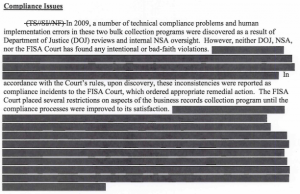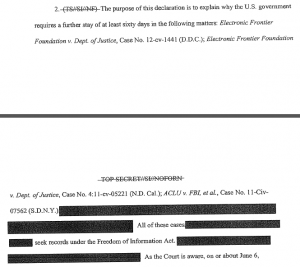Alexander Joel: Dragnet with a Human Face
For some reason, James Clapper’s office decided it would be a good idea to tell the rest of the world that it has a Civil Liberties Protection Officer, Alexander Joel. Today, he introduces himself in a piece in McClatchy.
Before you read it, consider that, back in 2006 when he was appointed, he said he was cool with Dick Cheney’s illegal wiretap program.
When the NSA wiretapping program began, Mr. Joel wasn’t working for the intelligence office, but he says he has reviewed it and finds no problems. The classified nature of the agency’s surveillance work makes it difficult to discuss, but he suggests that fears about what the government might be doing are overblown.
“Although you might have concerns about what might potentially be going on, those potentials are not actually being realized and if you could see what was going on, you would be reassured just like everyone else,” he says.
As for his essay, most of it is the same blathering boilerplate about Section 215 not collecting content and Section 702 not permitting “targeting” of US persons (without acknowledging that it does permit collecting of their content).
But there are two amusing details. First, in one paragraph he goes from actually mentioning the Constitution (which is welcome and novel!) to suggesting that a national security contractor like Edward Snowden would have been protected as a whistleblower.
Some people question whether people who work for the government can be trusted. In my experience, intelligence professionals � [sic] and those overseeing them – are profoundly committed to the oath they take to support and defend the Constitution. People inside government have questions and concerns just like everyone else. It’s my job to raise civil liberties and privacy issues about intelligence activities, and I do. If intelligence personnel have legal or civil liberties concerns, they can raise them in secure ways, including by contacting my office, offices of inspector general, or the congressional oversight committees. Under law, they are protected from reprisal if they do.
More interesting still, is Joel’s discussion of the two oversight Boards he claims have an active role in these programs.
Oversight boards are also involved. The President’s Intelligence Oversight Board reviews reports of potential violations. The Privacy and Civil Liberties Oversight Board, an independent federal agency, is currently conducting an in-depth review of these two programs, and has full access to classified information about them and to the personnel involved. My office works with both boards to ensure that they are receiving the information they need to perform their oversight functions.
Back in 2010 and 2011 — a time when Joel was in the office — ODNI at first stalled and then provided really confused information about whether there even was a functional Intelligence Oversight Board. And with the ascension of Chuck Hagel, who was a big part of the board, to be Defense Secretary, it is dysfunctional (unless Obama has snuck another person onto without telling anyone).
And PCLOB only recently became functional for the first time in Obama’s presidency, partly due to his delays, partly due to the Senate’s. And their recent public hearing on the NSA programs was underwhelming.
Joel has just bragged about how closely he worked with these Boards. He knows they’ve been of spotty functionality.
But this is the dragnet with a human face. The truth doesn’t matter so much as making people feel better.
Update, 8/15: On the subject of IOB and its parent board, the President’s Intelligence Advisory Board, Josh Gerstein has this:
The President’s Intelligence Advisory Board stood 14 members strong through 2012, but the White House website was recently updated to show the panel’s roster shrinking to just four people.
In the past four years, the high-powered group has waded into the implications of WikiLeaks for intelligence sharing, and urged retooling of America’s spy agencies as the United States withdraws from big wars abroad.
[snip]
Chuck Hagel was nominated in January as defense secretary and sworn in the following month. Venture capitalist and former lobbyist Tom Wheeler joined the board in 2011, but was tapped by Obama in May 2013 to head the Federal Communications Commission.
And Hagel’s co-chairman and fellow former senator, David Boren, said he asked to leave the panel early this year “because of the demands of my work as president of the University of Oklahoma. My request to the president was made shortly after the first of the year,” Boren said in a statement responding to a query from POLITICO.
Also exiting the board in recent months, according to the White House website: former Securities and Exchange Commission member Roel Campos, international lawyer and philanthropist Rita Hauser, stealth technology pioneer and former Undersecretary of Defense Paul Kaminski, Stimson Center CEO Ellen Laipson, and retired Air Force Gen. Lester Lyles. [my emphasis]
So yesterday, Alexander Joel pointed to IOB as one of the key oversight mechanisms over the dragnet. Today, we learn that every single member of the Board has been appointed away or asked to resign.
Update: Gerstein says on Twitter he thinks IOB is fully operational.
Actually, I think IOB more or less fully staffed & chaired by Meltzer. I think WH understands they need that up for lgl reasons


